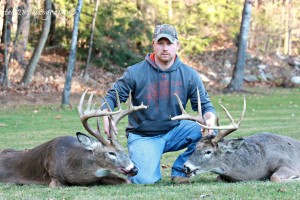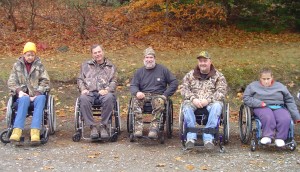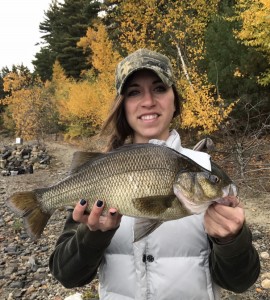Well, here we go again. Another sleepless night tossing and turning in anticipation of tomorrow’s opening day of shotgun deer hunting. Memories of previous opening days will undoubtedly flash through our minds. In my case, with the exception of a few years serving Uncle Sam, I have 59 such opening days to relive tonight. I might as well not even go to bed as I’ll be up before 4 AM anyway.
One memory that comes up regularly each year was the 1990 deer season. I had hunted in West Stockbridge one day with no luck, not seeing any deer or fresh tracks. Around noon, I was getting cold and decided to call it quits and go home early. Just before pulling onto my street, I changed my mind and decided to go up on October Mountain and hunt there for an hour or two.
Once there, I entered the woods behind where the old fire tower used to be. (Remember that place old timers?) My plan was to go down the wooded hill until I reached the edge of the swamp and take a stand there until around 3 PM. Then I planned to make a u-turn and come back to my truck.
I was hunting alone and it was a cold, windy day with a few spits of snow flurries. There was no snow on the ground for tracking, but upon approaching the swamp, I detected some freshly disturbed leaves indicating that a deer had recently passed through. I carefully, silently tracked the deer into the swamp. After a while I spotted it about 50 yards ahead in thick brush. It was motionless facing the other direction and had not detected me. I got down on one knee to steady my aim but there was a problem. Its legs and back were clearly visible but I couldn’t clearly see its head in the brush and couldn’t determine if it was a buck or doe. I didn’t have a doe permit.
After staying down on one knee for the longest time, my leg started to ache. I finally dropped onto two knees, but that didn’t spook the deer. It seemed like an hour passed with neither of us moving. I didn’t want to move my arm to see what time it was but I knew it was getting late…..perhaps 3 PM. Realizing I could stay no longer, I stood up and the deer spotted me and bounded off. I’ll never know what its sex was.
It was time to turn around and head back up the hill to my truck. While heading back out of the swamp, I began encountering thicker vegetation and the ground was becoming soggier. I didn’t remember it being that wet when I went in. After a while, it became clear that I had entered the swamp at some other location, with firmer, drier ground. I tried getting out of it at several different places but with no avail. It never occurred to me to use my compass as I only went into the woods a short way, plus I could see the hill that I wanted to get to on the other side of the swamp.
About then I was really concerned because the sun had set and it was becoming steadily darker. Reality was setting in that I was “turned around”. (Hunters don’t get lost, they just get turned around). They say not to panic at times like this and I kept telling myself just that. After all, I reasoned, I am not in some endless wild kingdom, but on October Mountain where I spent many hours hunting snowshoe hares with my beagles. In spite of that, my heart was pounding rapidly.
Experienced outdoorsmen say not to roam around in the dark, but get a good place against a lean-to or some other makeshift shelter, hunker down, light a fire if you can and wait until morning when you can see better. Don’t you know, I left my thermos, munchies and flashlight in the truck, thinking I wouldn’t be there long.
Then I remembered that I told my wife Jan that I would be hunting in West Stockbridge. No one knew I was here! There was no way to call her as cell phones weren’t around back then. When she gets home from work and finds me not there, she will probably call the police and report me missing and tell them I was hunting in West Stockbridge. After a while, there would perhaps be search parties, sirens, etc. Oh, the embarrassment of it all!
Well, I thought, if I am going to spend the night in these woods, I might as well spend it out of this swamp and on the dry hill behind me. Who knows, perhaps when I get high enough, I might be able to see where I originally crossed that swamp.
I was nearing the top of the hill, when I saw something shining up ahead. It was the moon reflecting off of my truck! Apparently in pursuit of that deer, I wasn’t paying attention to where I was going. I am ever so grateful that I didn’t shoot that deer and for not persisting on crossing that swamp. If I did, I would still be there dragging it in the wrong direction.
I sure made some blunders that day. Can you name them all?
Here’s hoping you deer hunters have a safe and enjoyable hunt, and don’t make the blunders that I made that day
License to Carry Class:
The Lenox Sportsmen’s Club is sponsoring a Mass State Police Compliant LTC Course on Saturday, December 3, from 9 AM to 1 PM. The cost is $70.00 per person. Preregistration is required. If interested contact Tom Nadolny at 413-822-6451 or tnadolny1@gmail.com



![IMG_9450[1]](https://www.berkshireoutdoorsman.com/wp-content/uploads/2016/11/IMG_94501-225x300.jpg)
